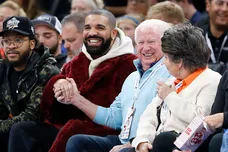Recent entertainment news has been punctuated with stories of abuse, namely sexual violence against women in the entertainment industry. With the release of Surviving R. Kelly came a renewed sense of awareness of this issue as it relates to the realm of music. Jada Pinkett, who has participated in this discourse on Red Table Talk, is asking her following to pinpoint why this type of negative behavior has become acceptable in this medium.
"In the midst of the social justices that we are fighting in regards to police brutality, I questioned why sexual violence and emotional violence towards women in music was still so acceptable, and not just acceptable but actually celebrated," she said in a video uploaded to Instagram. "We don't celebrate police brutality in music. Usually when its talk about it's informative or through the lens of protest."

The comments section was flooded with a variety of perspectives. There are mentions of sexual posturing by both men and women. One social media user suggested that "most artists depict themselves in a position of power," whether it be women exercising their right to wield their sex appeal or men leveraging these same images to bolster their own status as studs. While music videos like City Girls' "Twerk" are being celebrated as "empowering," the conservative consensus states that this representation only fortifies the objectification of women leading to negative outcomes. The overt sexuality is perceived as degrading, ultimately discrediting the women as equals deserving of respect, in this framework. Female entertainers are often promoted as objects of sexual desire and while many participate in this trend willingly as a form of empowerment, it is clear that the paradigm shift desired by some factions of feminism has yet to manifest from these efforts.

Some argue that men's natural instincts make them prone to display aggressive behaviors, especially when faced with women performing the kind of body-positivity and sexual freedom promoted by the younger generation's take on unapologetic feminism. This justification of abuse ignores the reasoning abilities of human beings and the concept of cooperation and community as an essential part of our survival. If rape culture is proving to be destructive to society's wellbeing, then one can assume that the human mind would override predatory inclinations in favor of community and direct the mentioned aggressivity towards constructive causes.

Others are blaming the reductive quality of popular music. "It’s all fun and games when it’s in a song...the beat is catchy, and the lyrics are often overlooked," one commenter suggested. This element may very well play a part in how consumers interact with content, especially considering our society's tendency to focus on visual stimulation. The vocabulary used in current popular music is dwindling in size and complexity. Messages propagated through lyrics are increasingly simple and easy to digest. Listeners are likely aware of problematic phrases and simply opt to ignore them in order to enjoy a song's musicality. It can also be argued that some listeners actually enjoy the negative content as it often glamourizes narratives regardless of their degree of morality.

Respectability politics might not have a rightful place in art. Freedom of expression is the driving force of creation. It may be up to the consumer to pick the voices that will dwell in their subconscious minds and serve as a soundtrack to their lives. Responsibility can still be placed on creators. Though we cannot expect entertainers to serve as righteous role models, we can hope that they take heed to the social contexts in which their chosen artforms were born as well as the concerns of their founders. Hip Hop isn't "just music." It is a culture with an international impact that cannot be disregarded.







